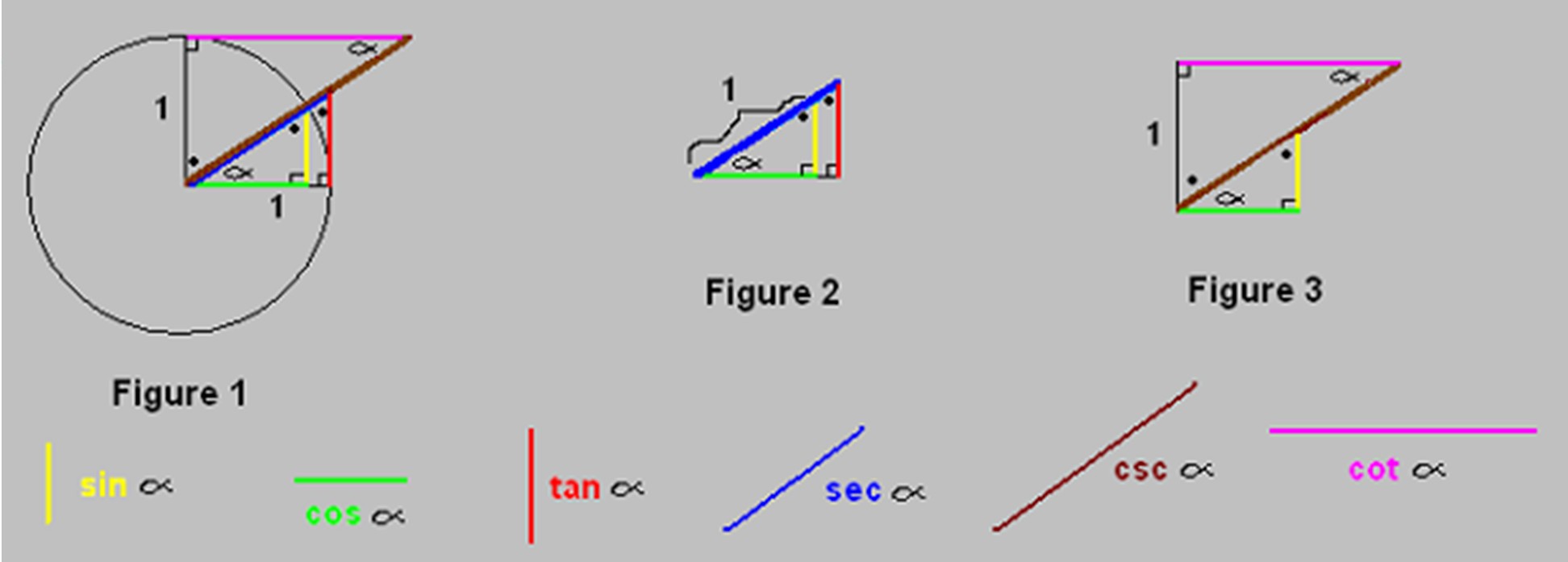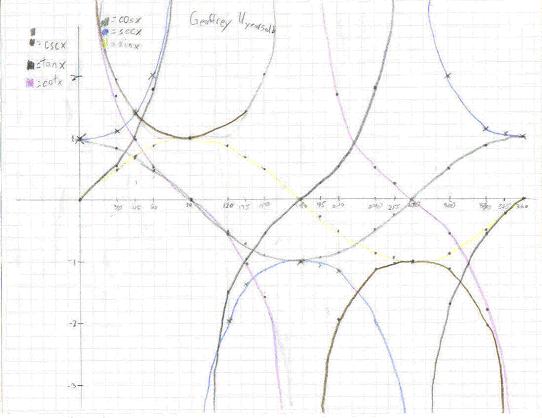The six trig functions
and identities
The
following diagrams are taken from the IES java applet in Japan at http://www.ies-math.com/math/java
, a very important way of looking at all 6 trig functions at once. The color
coding is the same as in the applet. Don uses these diagrams to get his students
to show the relationships (make identities-equations that are true for all
substitutions) between the 6 trig functions, expressing the tangent,
cotangent, secant and cosecant
in terms of the
![]() e
and/or the
cosine, the basis of all the trigonometric identities.
e
and/or the
cosine, the basis of all the trigonometric identities.
This
will be done by using the three similar right triangles in Figure 1. The
triangles are similar because their corresponding angles are equal (the![]() [right] angles, the ' [dot] angles, and the
[right] angles, the ' [dot] angles, and the
(alpha) angles). In similar triangles, the corresponding sides are proportional.
We will call the three triangles s (for small), m
(for medium) and L (for Large).
There are three things we have to keep track of in writing the proportions'
one is which pair of triangles we are
using, two, which pair of sides we
are using, which are opposite the corresponding pair of angles.

We'll start by finding
the tangent
of , and
go from the medium triangle
to the small triangle in Figure 2:
| The proportion is |  |
| where | tells us we are going from the medium
triangle to the small triangle. |
|
tells us we are looking for the
side opposite the |
| (top) and opposite the
|
| tells us we are looking for the
side opposite the
|
(top), (which is the radius of the circle, 1)
and the side opposite the
![]() angle in the small
angle in the small
| triangle- |
|
(bottom) |
So
 and multiplying both sides of the
equation by
and multiplying both sides of the
equation by
![]()
, we get
Identity
#1.

This is our first identity
for trig, read as:
the
tangent of alpha equals the sine of alpha divided by the cosine of alpha.
Now see if you can make up
other proportions to get secant
, cosecant
, and cotangent
in terms of sin
and/or cos
. You will get
Identity
#2.
 ,
,
Identity
#3.
 ,
,
Identity
#4.
If you use other
proportions, you can get other identities like
 .
.
Make sure you can do these
yourself.
Other important identities
can be obtained by using the Pythagorean theorem.
For example, in the small
triangle, Identity #5
![]() . In the medium triangle, Identity
#6
. In the medium triangle, Identity
#6
![]() and in the Large triangle, Identity
#7
and in the Large triangle, Identity
#7
![]() . Identity #6
can also be obtained from Identity #1 by dividing each term by
. Identity #6
can also be obtained from Identity #1 by dividing each term by
![]() and the third of these identities
can be obtained from
and the third of these identities
can be obtained from
Identity
#1 by dividing each term by
![]() .
.
Geoffrey, age 11 , sat at
Don's computer using the IES page linked above, and graphed the 6 trig
functions below:

To order
Don's materials
Mathman home